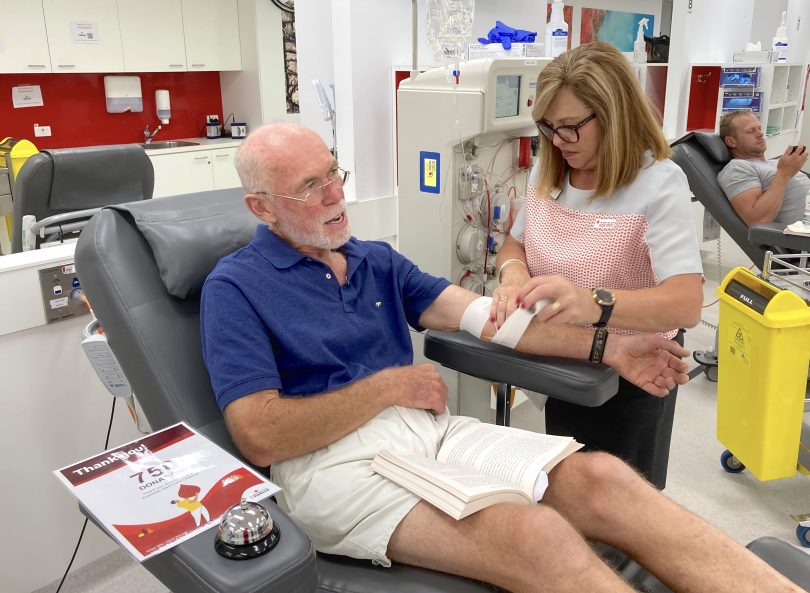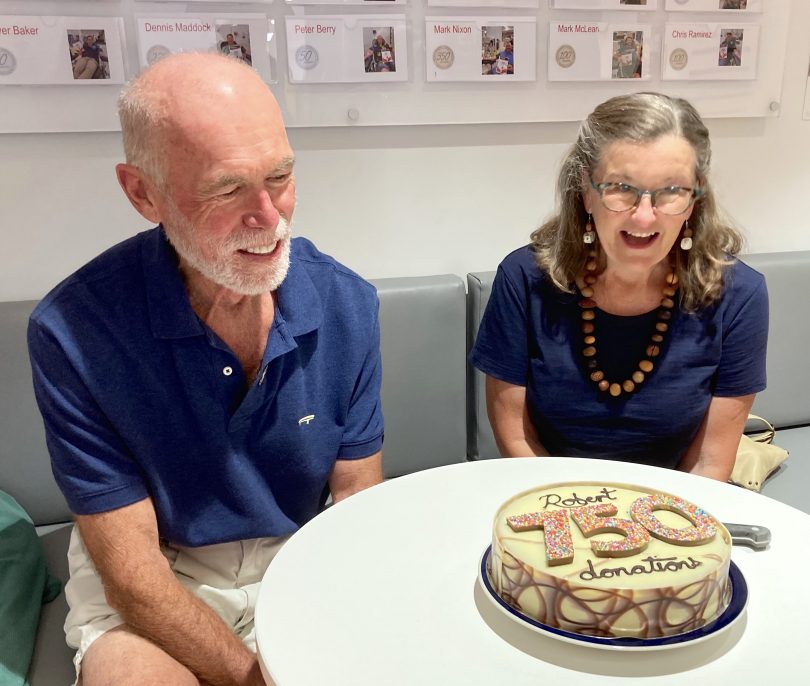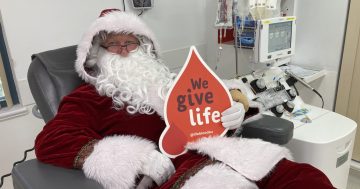
That’s a wrap for Robert Johnson’s 750th blood donation, with Lifeblood registered nurse Carole Banfield at the Garran Red Cross Lifeblood Centre this week. Photo: Supplied.
Bermagui resident Robert Johnson is reading a book on the Black Summer bushfires during a bit of downtime while making a milestone 750th blood donation at the Garran Red Cross Lifeblood Centre.
To the humble 62-year-old, who has been donating blood or plasma since June 1976, Mr Johnson said the donation is no different from any he or anyone else has made. Each donation is special.
Last year, he made the seven-hour return trip to Canberra from his home at Bermagui while bushfires raged in all directions.
As a volunteer firefighter with his local Rural Fire Service brigade, Mr Johnson would rise at sunrise and drive to Canberra each fortnight and roll up his sleeves to donate blood. He’d then roll on his firefighting gear and get on a truck until sunrise.
It happened a few times during January and February last year, but he was never going to miss sitting in the chair to make the life-saving donations.

Robert Johnson and his wife Elizabeth celebrate Robert’s 750th donation. Photo: Supplied.
“My wife Elizabeth is also a regular donor, and she was already up in Canberra because the situation at the coast was pretty hairy,” Robert tells Region Media.
“I drove up on the 9th of January and it was a pretty interesting trip. I met my wife in the car park of the blood donation centre at Garran and we had an emotional reunion of sorts.
“We both had appointments to donate booked, but Elizabeth’s blood pressure was fairly high so there was no way they were putting her in the chair.”
As is common with many donors, what began as a desire to give back to the community has become a habit that would be near-impossible to break.
“I love the drive, especially in winter, when I dodge the wildlife. The diversity of the landscape is amazing,” he said.
He makes the trip from Bermagui because the mobile blood donation buses on the south coast generally only take whole blood donations.
“I also love to sit in the chair to donate because it actually gives me a chance to do a bit of reading. I also like to look around the room and see some familiar faces. The staff are always absolutely phenomenal and operate with care and compassion, regardless of how many donations you’ve made.”
Canberra’s Lifeblood spokesperson Sally Gavin said the demand for blood or plasma donors is again urgent, with at least 100 more needed in the ACT this month.
“We know that many of our regular donors will be taking a well-earned break [this time of year] but the need for blood never stops,” she said.
“People in hospital need blood for cancer treatment, trauma, surgery, bleeding disorders and obstetrics. It’s vital that Australians step up to ensure patients receive the blood they need.”
Ms Gavin also said the average plasma donor donates about four times a year and the average blood donor twice a year. However, plasma can be donated every two weeks while whole blood can be donated every 12 weeks.
She said if all donors made just one more donation a year, Australia would have a steady supply of both.
B-positive Robert is reticent to be the poster boy for blood donors, but he said he is happy that his 750-donation milestone will be a goal other lifelong donors seek to catch.
“The tooth fairy doesn’t bring blood products. The Lifeblood service relies on people making that conscious decision to go and donate, and once you’ve made that decision, then follow it through.
“I’ll do anything to promote the value of donating blood, but I think there’s another poster boy out there who’s a little younger, is ripped, maybe has a few tattoos and doesn’t have a dodgy back,” he said.
To donate blood, plasma or platelets, visit the Red Cross Lifeblood website, call 13 14 95 or download the free Donate Blood app.














